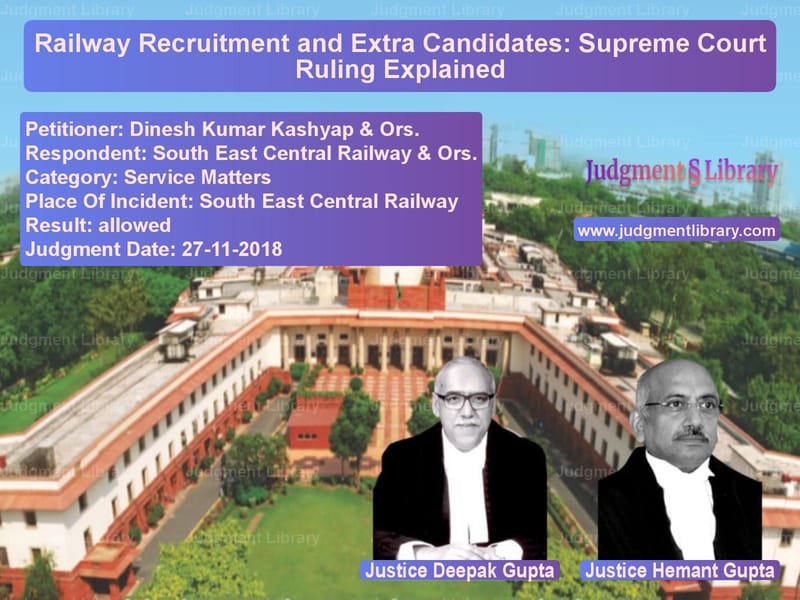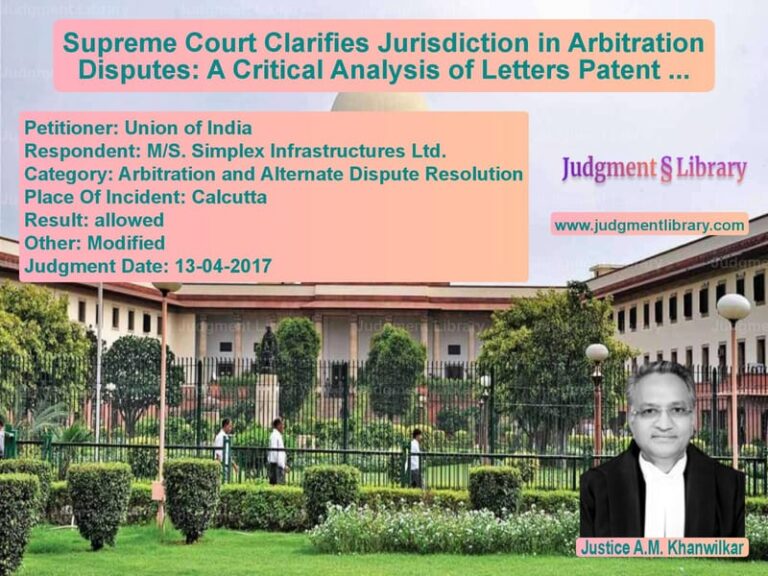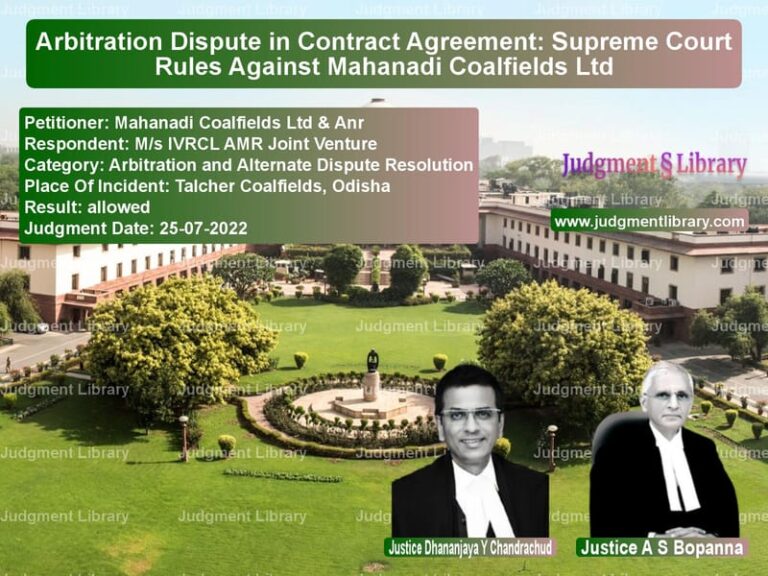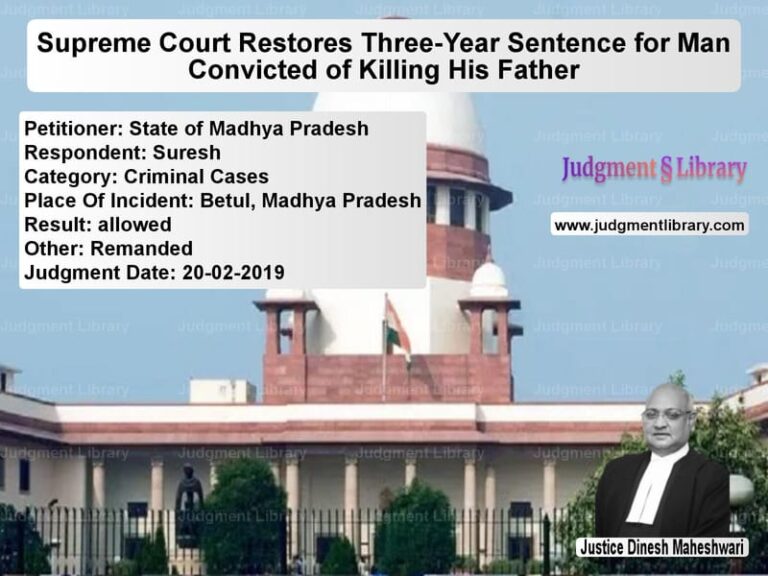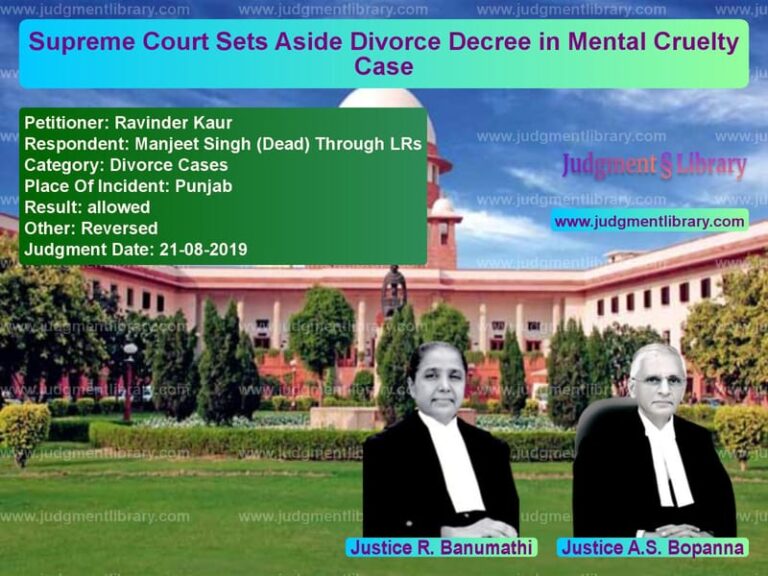Railway Recruitment and Extra Candidates: Supreme Court Ruling Explained
The Supreme Court of India delivered a significant judgment in the case of Dinesh Kumar Kashyap & Ors. v. South East Central Railway & Ors. concerning the recruitment process for Group-D posts in the South East Central Railway (SECR). The case revolved around the legitimacy of the extra 20% candidates called for document verification and whether they had a right to appointment.
The South East Central Railway had advertised for 5798 Group-D posts in 2010, calling an additional 20% candidates for document verification. However, despite 624 vacancies remaining unfilled, SECR did not offer appointments to the extra candidates. The appellants approached the Central Administrative Tribunal (CAT) and later the High Court, both of which dismissed their claims. The matter ultimately reached the Supreme Court.
Petitioner’s Arguments
The appellants contended that:
- As per SECR’s instructions, the select list included 20% extra candidates to prevent shortfalls in recruitment.
- Even after the completion of the recruitment process, 624 vacancies remained unfilled, and these should have been offered to the extra candidates.
- Similar appointments were made in other railway zones, making SECR’s refusal discriminatory.
Respondent’s Arguments
The SECR countered by arguing that:
- The purpose of calling 20% extra candidates was only to ensure vacancies were filled if selected candidates did not turn up.
- Merely being called for document verification did not create an entitlement to appointment.
- The system of maintaining replacement panels was discontinued after January 2014.
Supreme Court’s Ruling
The Supreme Court ruled in favor of the appellants, stating:
- The SECR’s refusal to appoint extra candidates, despite clear vacancies, was arbitrary.
- Calling additional candidates implied a legitimate expectation that they could be considered for appointment.
- Government authorities cannot act arbitrarily in public employment matters.
The Court held: “No doubt, it is not incumbent upon the employer to fill all the posts, but it must give reasons and satisfy the court that it had some grounds for not appointing the candidates who found a place in the replacement panel.”
Final Directions
The Court issued the following directions:
- Only appellants who approached CAT were eligible for appointment.
- Appellants would not be entitled to back wages.
- For seniority and pay fixation, appellants would be placed immediately above candidates selected in 2012 and below those selected in 2010.
- The SECR was directed to offer appointments within three months.
This ruling highlights the principle that state recruitment processes must be fair, transparent, and non-arbitrary. Candidates who participate in public selection processes have a right to reasonable expectations, and deviations from stated policies require justification.
Detailed Analysis of the Judgment
Public employment in India is governed by principles of equality, fairness, and transparency. The SECR’s approach of calling extra candidates but not considering them for appointment raised fundamental legal issues. The Supreme Court’s judgment reinforces the doctrine of legitimate expectation, where candidates who undergo a selection process should not be unfairly deprived of appointment if vacancies exist.
Furthermore, the Court clarified that a mere policy decision cannot override constitutional guarantees of equal opportunity in employment. The ruling sets a precedent for future cases where recruitment agencies attempt to circumvent merit-based selections.
As observed by the Court, “When a state instrumentality conducts a selection process, it must adhere to its own stated rules and procedures. Deviation without valid reasoning can amount to arbitrary action, violative of Article 14 of the Constitution.”
Impact on Public Sector Recruitment
This judgment will likely influence recruitment policies across various government sectors, ensuring that:
- Recruiting bodies clearly define the purpose and consequences of calling extra candidates.
- Vacancies are not left unfilled due to bureaucratic indifference.
- Legitimate expectations of candidates are respected.
- Public sector recruitment remains a fair and equitable process.
By directing SECR to fill the vacancies, the Court has reinforced that public employment is not a privilege but a right when due process has been followed. It also discourages recruitment agencies from adopting opaque and discretionary practices.
Petitioner Name: Dinesh Kumar Kashyap & Ors..Respondent Name: South East Central Railway & Ors..Judgment By: Justice Deepak Gupta, Justice Hemant Gupta.Place Of Incident: South East Central Railway.Judgment Date: 27-11-2018.
Don’t miss out on the full details! Download the complete judgment in PDF format below and gain valuable insights instantly!
Download Judgment: Dinesh Kumar Kashyap vs South East Central R Supreme Court of India Judgment Dated 27-11-2018.pdf
Direct Downlaod Judgment: Direct downlaod this Judgment
See all petitions in Employment Disputes
See all petitions in Public Sector Employees
See all petitions in Recruitment Policies
See all petitions in Judgment by Deepak Gupta
See all petitions in Judgment by Hemant Gupta
See all petitions in allowed
See all petitions in supreme court of India judgments November 2018
See all petitions in 2018 judgments
See all posts in Service Matters Category
See all allowed petitions in Service Matters Category
See all Dismissed petitions in Service Matters Category
See all partially allowed petitions in Service Matters Category

